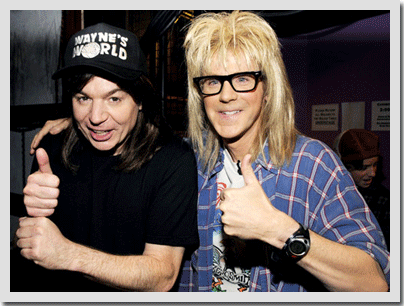Despite the fact that Wife and I shared an office space, and despite the fact that we were two of only about ten people in the office, we hardly exchanged a word during those first summer months. I would see her sit behind her desk, get up every once in a while to go for a cup of tea – tea is her cup of tea – and do whatever it was that she was doing.

The silence was partly a result of my being in a funk, and not really speaking with anybody at all. I sat behind my desk, listening to melancholy Finnish pop (Ed: strike as redundant), and chatting with buddies in the old country.
Then, a few months later, I finally spoke with her in that monastery-come-hotel in Italy. I spent that night cracking jokes, telling stories, and talking to her. In English.
Yes, I was embarrassed about it. After all, I had about nine years of Swedish studies under my belt at that point, and I could read the paper, write an occasional email, follow a conversation at a company meeting, and on a good day, even order a cup of coffee in Swedish without being answered to in English.
I was embarrassed and, at the same time, so smitten by her, that on my way to Finland for Xmas that year, I went out to the deck, and vowed to switch to Swedish – as soon as I got back. It would have made an awkward Xmas dinner had I switched right away.
A week later, on a ferry going the other way, I went out to the deck, looked out to the horizon, and reminded myself of the promise. And I switched.
It was weird. It was difficult. I went from fluent and witty to not so fluent and that’s-what-I-should-have-said. Wife, though, was the best possible teacher for me, never making me feel stupid or ridiculous. She would just gently correct me, or more often repeat what I had just said, but say it right. There was only one word that I used that she openly laughed at, but even then, “only because you sound so cute when you say it.” And I bought it.
Anyway, I said [shoot´sa] instead of [hoo´ssa] for “give a lift.”
(Note the past tense. I’ve practiced. I do hope I still sound cute, though.)
There were some cultural differences. The Swedes “hold their thumbs” for good luck, and wrap the other fingers around the thumb when they say it. Finns also say that they hold their thumbs, but we just hold them up. Which, naturally, means “great” in Sweden.
Today, after 11 years of communicating, we understand each other well. However, there are two instances which always demand clarification.
1. When is “next Sunday”? If today is Tuesday, and I say that I’ll have a hockey game “next Sunday”, will that be in five or 12 days? Now I say, “I have a hockey game on Sunday, not this coming Sunday but the one after that” and Wife replies, “OK, write it up on the calendar.”
2. How do you answer a negative question, like “don’t you want to go to a hockey game?” Eleven years ago what I said was the exact opposite of how Wife would have answered it. (And I don’t mean that she didn’t want to go to hockey, I mean my grammar).
I say “no” when I mean “yes”. I say, “no, I do want to go.”
Apparently that confuses Wife. Just like with “next Sunday”, we go back and forth with clarifying questions – “you do or you don’t?”, “will you be here on Sunday, not this coming up now, but the one after that, at six?” – until we agree on what was being said.
Then we just have to agree on the rest.
